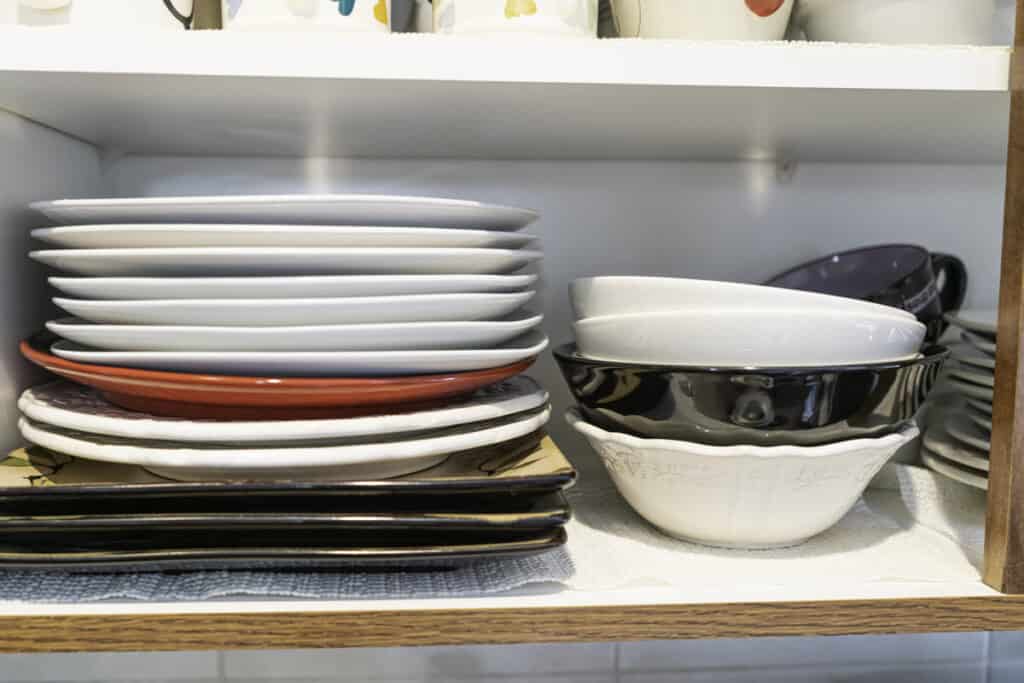Most crockery sets start as matching, well crafted sets that we’re proud of. Over time, a plate gets smashed here, a bowl chipped there, and eventually the time comes to replace the set entirely.
When you’re fast becoming one of those households that have no matching crockery, attention turns to buying a fresh clean set, but what happens to the old plates, mugs and bowls? How do you dispose of old, unwanted crockery?
Contents
Taking Crockery To Tips
Crockery can be recycled, but not in residential recycle bins. Most councils accept ceramic plates, bowls and other crockery at HWRC’s (aka tips or dumps), commonly in the rubble skips.

While tips often accept unwanted crockery in their rubble skips, there’s usually a better alternative for plates, bowls and the like if they’re not broken.
Old Crockery And Dinner Sets
Many of us are lucky enough to be able to just go out and replace items that have seen better days. Just because your plates are marked or your bowls are chipped doesn’t mean they’re no longer useful.
While we need to move away from the disposable culture we’ve all become far too used to, the fact is we all want to replace things from time to time. Before you throw older items in the bin though, why not consider donating them?
Charity Shops Accept Dinner Sets
Your local charity shop will almost certainly be pleased to receive a donation of old plates and bowls that are in one piece, a little superficial damage like a few marks or small chips is normally no problem at all.
There are lots of families that are just starting out in their first homes that are trying to set themselves up for the early months or years and have very tight budgets. Charity shops are a great asset for people with limited disposable income, and your donations can also help them raise valuable funds for their cause at the same time.
Local Good Causes And Support Initiatives
Ask around too – local Facebook groups will likely be able to tell you about initiatives that are helping vulnerable people with life’s essentials. People who are trying to get life back on track really won’t worry about whether their plates match, so local good causes can be great recipients so you can do your bit to help the local community.
Remember too the old phrase ‘Charity Begins At Home’. Check with friends and relatives – you never know who has a student heading for university or might be in need of a couple of spare bowls themselves.
Re-Use Beats Recycling
What we’re really getting at here is that recycling is great, but finding a new home for items is better. Recycling processes use energy and chemicals to prepare items for their next use, both of which have their own environmental impact.
Conversely, getting more use out of any items, including old crockery, means less new products need to be manufactured. That’s why we harp on so much about re-use on this site – it’s so much better than recycling if it’s an easy option.
Where it doesn’t make sense environmentally is if you’re making a significant journey that you wouldn’t normally make. However, even then, gifting items carries value in itself, plus gives you the warm fuzzy feeling inside that comes with a good deed.
What If I Need To Bin Crockery? What Bin Should I Use?
If you’ve got broken plates, bowls, jugs and so on, then no-one’s likely to want them, unless you’ve got a friend that’s an artist specialising in sculptures made from pieces of ceramic crockery. Not that we’ve checked, but it’s safe to assume that’s a very niche market that doesn’t apply to anyone reading this!
So, let’s assume that some crockery has to go in the bin from time to time, as not everyone needs to go to the tip, or even have transport to do so. Driving miles to drop off a broken plate doesn’t make much sense, so what bin does a broken plate or jug go in?
Some people make the mistake of putting them with glass bottles – but that’s just contaminating your recycling. We’re not quite sure why people make that choice, maybe because both glass bottles and plates smash when you drop them? Other than that, they’re very different and certainly need to go in different bins.
Ceramics like plates, bowls, jugs and mugs are made from materials like clay, and fired to harden them – you’ll probably remember the kilns from art classes at school. They’re certainly not glass, and as far as we know, there’s no suitable recycling collections for them anywhere in the UK. That means they go in the general waste bin with your normal household rubbish that’s non recyclable.
Uses For Broken Crockery
As a final note for unwanted crockery, and this actually applies whether it’s broken or not (as you can pretend to be at a Greek wedding and break them yourself), is some gardeners believe plant pots can use shards of crockery and pottery for improving drainage.
Just put the remnants into the bottom of the plant pot before the soil and plant is how the advice goes. However, you’ll need to make your own mind up about whether this is true or folklore, as other people believe it can actually hamper plant growth, including Richard Jackson from QVC.
All we know is that finding a way to re-use waste is better than it heading for landfill – our gardening acumen isn’t anywhere near at the same level as our recycling prowess!
